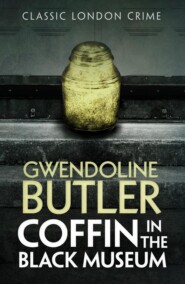По всем вопросам обращайтесь на: info@litportal.ru
(©) 2003-2024.
✖
Death Lives Next Door
Автор
Год написания книги
2019
Настройки чтения
Размер шрифта
Высота строк
Поля
“Would you mind stepping off my foot?” she said sweetly, turning round. But after this Ezra saw to his amusement that they went away amicably together. You could never tell. Ezra nodded in approval. Over the years a grandfatherly attitude had grown up in him, a feeling that love and marriage were not for him. It had been unconscious, he had hardly noticed it, he thought, until lately, when it had taken a beating. It had been a peaceful state to be in, he recalled wryly.
As he thoughtfully pinched the lettuce for his dinner and eyed the rye bread to see if it was stale, the subject came up again. Mrs. Hofmanstall leaned over the sauerkraut and breathed her fears and garlic at him in the same breath.
“Of course it may not be true, Mr. Barton, I do not say it is, but my customers tell me.” Mrs. Hofmanstall’s customers told her everything; there was certainly every opportunity to as shopping there was a slow business. There was time for life friendships to be built up.
“Have you been followed?”
Mrs. Hofmanstall drew herself up. “Me? No. Naturalich not.” She lowered her voice again. “All we hear is not right. It is not always follows. Sometimes he is there before.”
Ezra said seriously: “You know there’s a fallacy there somewhere, Mrs. H. But I get the feeling you describe. Nasty.”
He gathered up his shopping and went on.
He continued his walk, through Market Street, down Cornmarket, under the trees of St. Giles, casting a longing but declining look at The Playhouse beside whose doors he could see three of the people who amused him most and whom he most wished to impress. He squared his shoulders and assumed the stern look of a warrior king. One of the things Ezra did most was to act and they were casting for Henry IV, Part Two. He was longing to be the young Prince Hal. He realised however that he was most likely to get the part of the sick Henry IV. These were the parts he always got, he had been the King in Hamlet more often (he reckoned) than any man living. It was beginning to affect his character; you couldn’t be called lecherous so often without beginning to feel it.
He cleared his throat and began to recite the great lines from Henry IV,
Oh sleep, O gentle sleep, Nature’s soft nurse, how have I frighted thee?
going through the catalogue of the sick king’s symptoms and ending:
Uneasy lies the head that wears a crown.
Yes, he could see himself in the part. He could see Lamia Beauregard tossing her golden locks at the producer and he remembered how good, in a dreadful sort of way, she had been as Hamlet’s mother. But then to be good in a dreadful sort of way was just what was demanded of Hamlet’s mother. No doubt Lamia, an improbable but suitable name now he came to think of it, remembering Keats’ girl who was metamorphosed into a snake, was not at all worried about anyone following her. Probably she expected that someone would be following her, just as she expected (and certainly would get what she expected) that she would soon go to London and throw her lustre upon such totally unknown stars as Dorothy Tutin.
He could see that Lamia was beckoning and after wondering whether it would look undignified or not to turn round and go, curiosity took him. After all he could walk down St. John Street to pay the call which he intended to pay before lunch and the thought of which was making a little warm fire of pleasure burn in his mind.
“We are talking about doing Ibsen,” said Lamia at once.
“Well, I think I’m more of a Shakespeare man.”
“There are other actors.”
“Shakespeare’s always safe,” said the producer. “You can do him very badly indeed, and frankly we mostly do, and still get away with it.”
“How are you getting on with Henry IV, Part Two?”
“Very nicely. We’ve got a lovely Harry,” said the producer with enthusiasm, “just the right mixture of bounder and cad. No Henry IV yet though,” and he looked thoughtfully at Ezra who sighed. Old dying Henry was just made for him.
“What about King Lear?” he suggested, remembering that there were great parts for dying old men.
“No part for me in it,” said Lamia sternly. She knew her limitations, which included Cordelia.
“There are other actresses,” he reminded her. “And other parts; what about Goneril and Regan?”
“Oh, that old bitch.”
“I always think, Goneril and Regan, yes and Cordelia, too, are just the other faces of one personality,” said the producer. “That’s how I’d do it. All of them with the same face, only different. A triple split personality.”
“And then you might have them all looking exactly like Lear,” said Ezra entering into the spirit of the thing. “Which, when you come to think about it, is really most likely.”
“I’m afraid it might seem a little like a Crazy Revue,” said the producer regretfully. “Talking of Regan,” he said, looking doubtfully at Ezra, “have you seen anything of Rachel lately?”
“Yes,” said Ezra shortly. “And I don’t know why she reminds you of Regan.” The worst of being in love was that it made you so touchy.
“Oh, just the initials,” said the producer. “I wanted to talk to her.”
“She was at Marion Manning’s. I’m on my way round to Marion’s now.” Marion’s name produced the silence it usually did. She was a fabulous figure. But what did people really know about her? That she had been four years old when the First Great War started, in which her father had been killed, and only nine when it ended, and yet she had written one great poem on it which anyone would have been glad to have written, and then never touched the subject again. That she had become an anthropologist, been a member of a highly publicised and tragic expedition to Central America on which two men had died; that she had written a controversial book about it and then announced that anthropology did not provide the discipline she wanted, and turned herself into a philologist and a very good one at that, but that her name was still good for a paragraph in the Sunday newspapers. What did this young producer know about her? That he had seen her stocky grey-haired figure (with the slightly dragging left leg where the bomb had lamed her) at parties and heard her talking?
The three of them walked a little way with him before the producer looked at his watch and remembered a tutorial, and with an anxious look, which at once reduced his age by ten years (and, so Ezra thought, added them to his) disappeared.
“Give my love to Tommy,” Ezra shouted. He knew the producer’s tutor.
“Unless I have had some good things to say about the French Revolution I won’t dare,” called back the young man. The third member of the party was a silent young man from St. John’s who had never in all the time Ezra had known him spoken one word, but drew constantly upon an old pipe and looked deep. Lamia and the silent man, who was continuing to look deep, went off together.
Ezra continued on his way down St. John Street and through Wellington Square to where Chancellor Hyde Street runs into Little Clarendon Street. When the houses it contained were built there were fields where Walton Street now lies. The houses were old pretty red brick cottages converted at great cost into cosy little houses watched over by the Georgian Trust. Marion lived in the corner house and although Ezra had got used to it the house was unmistakably Marion’s.
Marion was standing in the window reading a book and her tom-cat, Sammy, was sunning himself in the garden. There was no love lost between Sammy and Ezra. Sammy raised his head as Ezra came past, and glared at him, slightly showing his teeth as he did so. All right, thought Ezra, if that’s how you feel, I don’t feel any better about you, and he bared his teeth back. The Professor of Morphology who was passing looked apprehensive, and Ezra realised sadly that the Professor, a nervous and humble man, had taken the threat as directed at himself. By the time he got to Marion’s he was in a bad temper.
“I find the human race difficult and incomprehensible at the moment, Marion,” he said, falling back into a chair.
Marion stood there running a hand through her short silver hair which seemed to shine with a light no one else’s had; her bright friendly brown eyes looked at him with inquisitiveness.
“I don’t suppose it’s occurred to you to number yourself among the unaccountable?” Marion’s tone was wry.
Ezra blinked.
“Oh, do you think so?” He considered. Perhaps this curious atmosphere he had noticed among his friends lately was coming from within him and not from without.
“I think I’m having an intellectual crisis!”
“What a luxury for you. I couldn’t afford one.” Marion was continuing in wryness. “Too old.”
“You’ve had them though,” pointed out Ezra, remembering the change-over from anthropology to linguistics. He looked at Marion and saw that she looked dry and thin. It struck him that he had not really observed Marion for a long time. She did look older.
“Oh, you have the special Oxford disease … Ennui, reluctance, it comes over everyone. Closely related, I always think, to the medieval ‘accidie’, one of the seven deadly sins, you may remember. Sloth is its other name.”
Ezra flushed. Marion could always sting.
“It especially attacks intellectuals. I suppose you count as that?”
“You’ve brought me up to be one.” Ezra regarded Marion as his intellectual mother. He hardly remembered his real one. Marion, however, was not obviously maternal. He had come to her for teaching in his first term, young and earnest, and she had moulded him. It was going to be difficult to tell Marion what he wanted to tell her.
“I begin to feel that perhaps I’d better get away and strike out in a new sea.”
Marion frowned.
“I’ve had a sort of offer,” he hurried on. “From Bridport. You know John Farmer has the new Chair, he’s sort of offered …”











